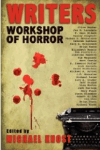Writers Workshop of Horror
Michael Knost, Editor
Woodland Press, LLC
Trade Paper, 262 pages, $21.95
Review by Sheila Merritt
A fascinating and amusing aspect of reviewing a multi-contributor “on writing book” is: The realization that, as in fiction, some of the anecdotes and insights are more entertaining than others. When it comes to being verbally adept, as well as imparting information, there are those writers who can produce dazzling essays. Others are myopic in being informational, and dry in their delivery. Then there are some, who metaphorically throw up their hands, and say there are no methods to follow. In Writers Workshop of Horror, all of these points of view and styles are represented. What the aspiring/fledging or experienced writer gleans from these reflections will be highly subjective.
There are pragmatic, realistic looks at writing. Lisa Morton, when discussing writing an original horror screenplay, states that it is logistically desirable to live in Los Angeles, and be someone who possesses social skills that will enable making connections. Shrinking violets don’t do well in this environment. Elizabeth Massie reminds the reader to go to the first page of favorite horror fiction, and look at a captivating early sentence or paragraph and see how the writer employs the “hook” of involvement.
Michael Arnzen delivers in “Scene and Structure in Horror Fiction” the most lyrical of analogies: “Words are like musical notes, so be sure to think about how the notes you are choosing are orchestrating the dance of the story. The more ‘other-worldly’ the moment of your story, perhaps the more ‘poetic’ your prose should become in trying to express the inexpressible.”
So, is there a bottom line or basic theme that is prevalent in this book? Two very different ideas get reiterated: The first seems simple. It is just obeying submission guidelines; don’t alienate an editor by ignoring the requisites or format. If a writer starts off on bad footing, then what follows is usually a lack of respect from those he or she most wants to impress. The other literary tip, which is repeated four times in this book, is how the writer’s words sound when read aloud.
Horror author icon Ramsey Campbell says, regarding Poe’s The Fall of the House of Usher: “Like all good writing, it gains by being read aloud.” Thomas F. Monteleone writes, “One of the best ways to know your dialogue is working is to read it out loud.” Writer Mark Justice concurs: “Now I read everything out loud before I submit. It’s made a difference in the quality of my work and in the number of acceptances.” Then there’s Clive Barker: “It’s a lesson I learned from one of Joseph Conrad’s letters. Reading aloud would be his way to discover where the errors were, where the cadences were wrong, and I’ve found that to be absolutely wonderful advice, and I always do it however lengthy the books become.”
Writers Workshop of Horrors is twenty-eight interesting articles compiled by editor-author-columnist Michael Knost on the craft of writing horror. Published authors and novice writers will find appealing and applicable topics that may further inspire them. At the very least, readers of this book will be stimulated to think about how horror tales are constructed, and appreciate the workmanship involved.










Great review. And about the “read it aloud” tip, it is repeated one more time by Brian Yount in the last chapter.